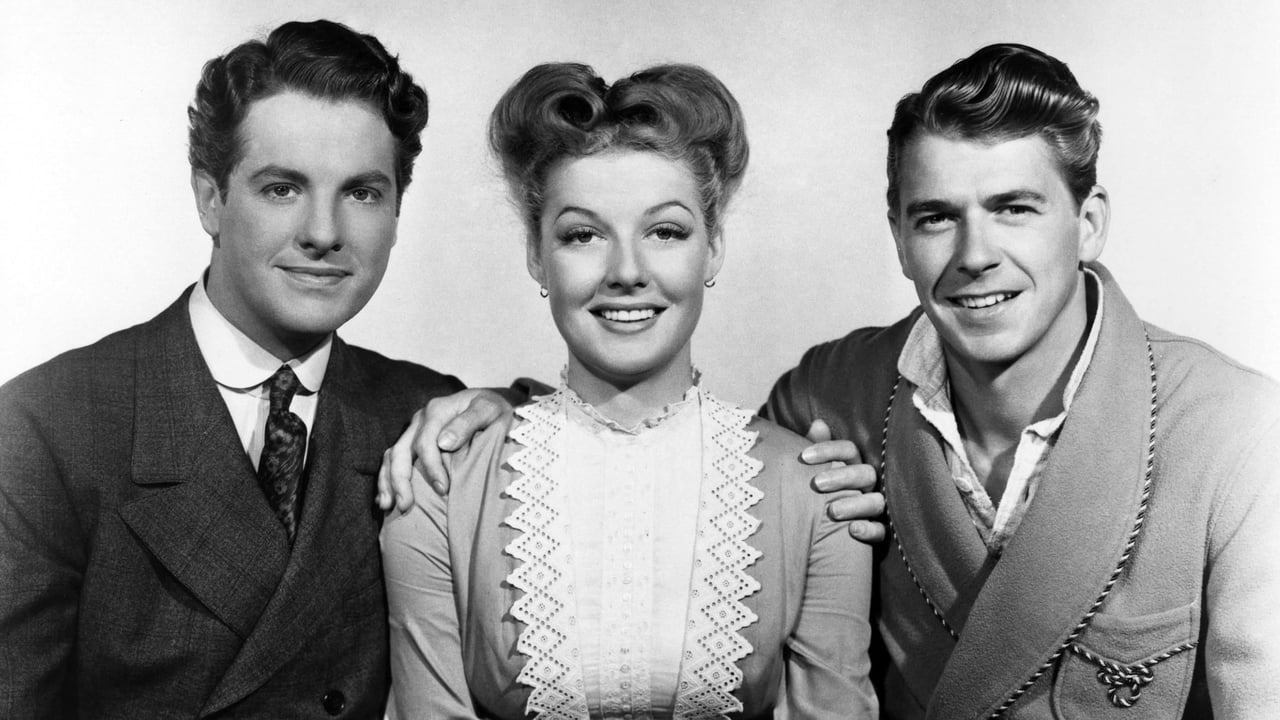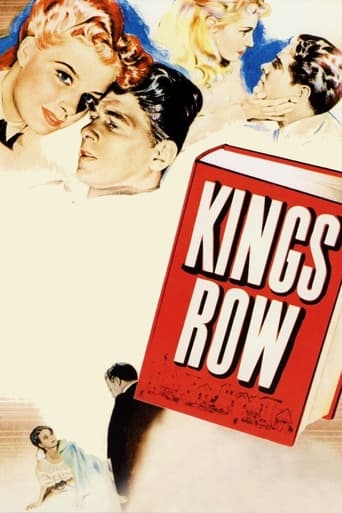Kattiera Nana
I think this is a new genre that they're all sort of working their way through it and haven't got all the kinks worked out yet but it's a genre that works for me.
Protraph
Lack of good storyline.
Micah Lloyd
Excellent characters with emotional depth. My wife, daughter and granddaughter all enjoyed it...and me, too! Very good movie! You won't be disappointed.
Benas Mcloughlin
Worth seeing just to witness how winsome it is.
tomsview
Set at the turn of the 20th Century, Henry Bellamann's novel seemed to embrace the whole town of Kings Row.
Many characters received a page or two then faded into the background. It also contained Bellamann's worldview with insights into just about every aspect of the human condition from birth to death with liberal doses of incest, lust, racism, fraud and bigotry along the way. Kings Row was a busy place. Some things just couldn't be included in a 1940's movie. Screenwriter Casey Robinson masterfully eliminated buggy loads of peripheral characters while retaining the central story and much of the novel's unique wisdom, although the ending was changed. This film is a super-charged emotional experience as it follows the three main characters, Parris Mitchell, Drake McHugh and Randy Monaghan from childhood to often-painful adulthood. The breathless enthusiasm of Robert Cummings' Parris takes some getting used to, but it is Ronald Reagan as Drake who burns himself into the memory with his cry of "Where's the rest of me?" Ann Sheridan glows in her role as Randy, the girl from the other side of the tracks who has more class and substance than most from the snootier end of town.The supporting cast adds much to "Kings Row" especially Claude Raines and Betty Field as the troubled Dr. Tower and his daughter Cassandra. Charles Coburn plays Dr. Henry Gordon, creating the most sadistic M.D. this side of a horror movie. Inspired script, direction and photography are topped off with Erich Wolfgang Korngold's sweeping score. His music communicates the unspoken thoughts of the characters and helped create many lump-in-the-throat moments. Remove his music and "Kings Row" wouldn't be the same. The emotional level may be off the Richter scale, but there is a seductive magic to this old movie. It defies you to remain unmoved.
blanche-2
I saw "Kings Row" years and years ago, and I just watched it again. A truly beautiful film.But boy, did you have to read between the lines.This is the kind of film my mother would have seen and not known any of the unspoken things that were going on. I have a feeling she wasn't alone.The story concerns people who grew up together - Parris, Drake, Cassie, and Randy - and what happens to them. It stars Robert Cummings, Ronald Reagan, Betty Field, and Ann Sheridan.The role of Parris was intended to be the star role and go to a big name. I wasn't around in 1942 but I know that Robert Cummings was certainly known but not one of the top leading men. In fact, the year of this film was his biggest - he did this movie and Saboteur. And Hitchcock didn't want him for Saboteur anymore than Hal Wallis wanted him for this.The role was supposed to go Tyrone Power, who would have been an ideal Parris, but Fox wouldn't lend him out -- and I have a feeling they waited until the last minute to refuse. As far as I'm concerned, that little boy Parris looked just like Tyrone Power, and Parris is the only character to get a star entrance.Anyway, the studio wound up borrowing Cummings from Universal and using some Warners players for the rest.Now, lots goes on in this town that is blatantly covered in the novel but only hinted at here. The biggest thing is the incestuous relationship between the woman Parris loves, Cassie (Field) and her father (Claude Rains), who is Parris' mentor when he returns from his studies.The only indication of this is when the constable asks Dr. Gordon who has just finished examining Cassie, if there was "anything else," to which Gordon replies, "Just something about the girl." They think the father is Drake, who claims he and Cassie were in love in order to protect Parris.That was the biggest "unspoken" though there were a couple of others. Blink and you miss it.I won't go into the whole story, I'll just say it was well-acted. Ronald Reagan did a terrific job. People always make fun of him, but in the films of his I've seen, he was very charming with a flair for comedy - and here, he shows dramatic chops. It's a strong role. Ann Sheridan has a slightly different role as well. She's a devoted girlfriend and then wife and not a sexy good time girl, coming off as intelligent and lively.Robert Cummings brought a boyishness to Parris in an earnest and sincere performance. Power would have brought it up a notch, though.Because of the casting, Kings Row does not signal that it was a huge film, which it was intended to be. It's the same as Saboteur seeming like one of HItchcock's smaller movies when it wasn't at all. He wanted Gary Cooper and Barbara Stanwyck. I'm sure no one would say it was a smaller film had he been allowed to cast them. Same here.
AaronCapenBanner
Sam Wood directed this turn-of-the-century drama that stars Ronald Reagan as Drake McHugh, an amiable young man who plans on becoming a businessman as soon as he comes into his full inheritance; in the meantime, he is also a ladies man...Robert Cummings plays Parris Mitchell, who plans on becoming a doctor, though is in love with Cassandra Tower(played by Betty Field) who lives with her reclusive father(played by Claude Rains) whose fates will be tragic... Ann Sheridan plays their mutual friend Randy Monaghan, who is in love with Drake, and will be invaluable to him when tragedy strikes... Fine acting and interesting plot in this memorable film, based on a successful novel.Features the famous "Where's The Rest Of Me!?" scene with Ronald Reagan, the future 40th U.S. President.
moonspinner55
Two boyhood pals from the 1890s grow into young adults with tumultuous lives: Robert Cummings is the studious kid who moves away from small town America to study psychiatry in Vienna (!), while Ronald Reagan loses all his money in a bank swindle and has to find work on the opposite side of the tracks. Intelligent, if melodramatic, adaptation of Henry Bellamann's novel isn't particularly well-directed (nor is it sharply edited, as the scenes and transitions could use more verve and snap); however, it does have Reagan at the peak of his acting charms, and his strong performance really carries this a long way. Cummings, whose make-up job causes him to resemble an actor from the silent era, is less interesting, and the supporting performances are variable, but film is still quite absorbing and entertaining. Excellent music score by Erich Korngold, handsome cinematography by James Wong Howe. Though a Best Picture nominee for 1942, the movie was originally set for release the year before, with Warner Bros. getting cold feet and putting it on ice. Once they did release it, the film failed to find much of an audience. **1/2 from ****

